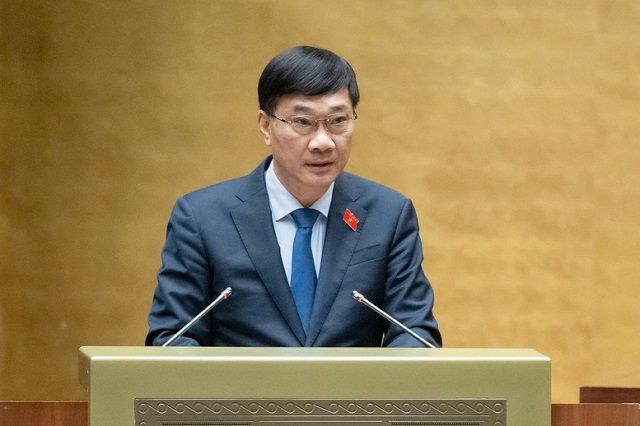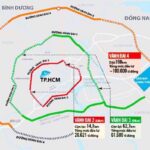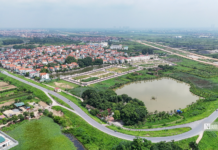On the morning of October 25, continuing the agenda of the 8th session of the 15th National Assembly, Mr. Vu Hong Thanh, Chairman of the National Assembly’s Economic Committee, presented a report on the absorption, explanation, and editing of the draft Law on Urban and Rural Planning.

Mr. Vu Hong Thanh, Chairman of the National Assembly’s Economic Committee, presents a report on the absorption, explanation, and editing of the draft Law on Urban and Rural Planning
|
According to Mr. Thanh, based on the opinions of the National Assembly deputies, the agencies of the National Assembly, and the Government, the Standing Committee of the National Assembly has directed the relevant agencies to research and edit the draft Law.
After being edited and perfected, the draft Law consists of 6 chapters and 65 articles; 2 articles were removed and 2 articles were added compared to the draft Law presented at the 7th session.
Ensuring that new and progressive points quickly come into life
Regarding the relationship between the plans belonging to the system of urban and rural planning, Clause 2 and Clause 3 of Article 7 have been edited to clearly define the master plan, the sub-plan, and the detailed plan, which are concretized and detailed gradually.
At the same time, it clearly defines the contents of the master plan that are concretized in the sub-plan, and the contents of the sub-plan that are concretized in the detailed plan. The content, requirements, and principles of concretization must be determined and clearly defined in the plan to ensure clarity and convenience in the implementation process.
The relationship between the plans belonging to the urban and rural planning system and the plans belonging to the national planning system is specifically regulated in the 2017 Planning Law. Accordingly, Clause 4, Article 6 of the Planning Law stipulates that urban and rural planning must conform to national, regional, and provincial planning.
Mr. Vu Hong Thanh said that on September 24, 2024, the Government submitted a proposal on the project to amend and supplement a number of articles of the draft Law amending and supplementing a number of articles of the Law on Planning, the Law on Investment, the Law on Investment in the form of Public-Private Partnership, and the Law on Bidding to the National Assembly for consideration and approval at the 8th session, following a shortened procedure.
Accordingly, the Government has proposed to amend the 2017 Planning Law to expand its scope, stipulating that urban and rural planning is a “technical and specialized” plan belonging to the national planning system, but there are no clear and specific regulations on the relationship between technical and specialized plans and between technical and specialized plans and other plans belonging to the national planning system.
The Chairman of the Economic Committee emphasized that this content needs to be carefully and carefully considered, and it is necessary to continue to clarify the consistency of the investment project with the national, regional, and provincial planning when considering the investment policy, avoiding obstacles in the implementation process.
In the process of absorbing and editing the two draft Laws, the Standing Committee will continue to direct the agencies to research and perfect them, ensuring the synchronization and uniformity between the two draft Laws.
Regarding cases related to the scope of planning and administrative boundaries when formulating urban and rural planning, the draft Law has been edited to clearly define cases related to the scope of planning and administrative boundaries, aiming to minimize the number of plans that need to be formulated.
Regarding the time limit for formulating urban sub-plans, Mr. Vu Hong Thanh said that based on the Government’s opinion on simplifying the procedure to shorten the time for completing urban sub-plans, the draft Law has been amended as follows: Do not get feedback from the community for the task assignment phase of the plan (only get feedback from the state management agencies related).
The time for getting feedback from the agencies was adjusted from 10 days to 7 days; the time for appraisal of the planning task was adjusted from 25 days to 15 days; the time for appraisal of the urban sub-plan was adjusted from 60 days to 30 days. A regulation was added to the content of the master plan to identify areas expected to have sub-plans.
On that basis, the draft Law has adjusted the regulation on the maximum time for completing the formulation and approval of urban sub-plans after the urban master plan is approved from 12 months to 6 months.
The National Assembly Standing Committee requested the Government to continue to monitor and direct this content in the process of organizing the implementation of the Law after its promulgation, continue to review the requirements to reduce the time at all steps in the process of formulating and approving urban and rural planning, ensure the arrangement of sufficient resources and improve the capacity for formulating, appraising, and approving urban and rural planning to meet the requirements of the task; urgently organize the formulation of urban and rural planning in accordance with the provisions of this Law, ensuring that the new and progressive points of the Law quickly come into life.
Do not make a common plan for communes, except for special cases
At the same time, the draft Law has been amended to basically not make a common plan for communes; the common plan for districts includes the contents of development orientation for communes; only make a common plan for communes in cases where a commune has special characteristics and needs to make a separate common plan.
The People’s Committee of the district level must clarify the necessity, practical basis, population distribution, area, socio-economic development requirements, national defense, security, culture, and natural conditions, landscape for communes with special characteristics that need to be made into a separate common plan to submit to the People’s Committee of the provincial level for decision in the task of the common plan for the district.
At the same time, in case of the need to adjust the content of the common plan for the commune integrated in the common plan for the district, the People’s Committee of the district level can proactively adjust to implement, promptly meet the practical requirements. In addition, the draft Law has supplemented the provisions on cases where it is not necessary to make a common plan for communes related to the scope of planning and administrative boundaries.
Also this morning, the National Assembly continued to discuss in plenary session some contents of the draft Law on Urban and Rural Planning that still have different opinions.
The Great Administrative Shift: 13 Provinces Reimagined, 87 Communes Consolidated
The Standing Committee of the National Assembly has unanimously voted in favor of a resolution to restructure and merge several administrative units across 13 provinces and cities. This decision, passed by all present members, involves the reorganization of 5 district-level units and 186 commune-level units, streamlining and consolidating local governance for improved efficiency and effectiveness.
The Transport Ministry Proposes Alterations to the Implementation Plan for the Construction of Ho Chi Minh City’s Ring Road 4
The Ministry of Transport has proposed a plan to the Ministry of Planning and Investment and the People’s Committee of Ho Chi Minh City to develop the city’s Ring Road 4. This proposal highlights the ministry’s proactive approach in addressing the city’s infrastructure needs and enhancing its transportation network.













































